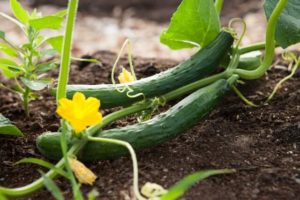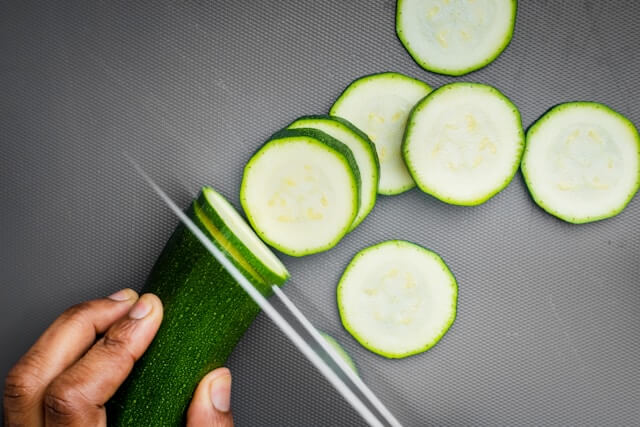Cucumbers have been facing a bit of a crunch lately. The issue seems to be rooted in weather woes down in Mexico, a major supplier of cucumbers to the US and Canada. Extreme weather events like droughts, cold spells, and even storms have impacted harvests, leading to a lighter supply of cucumbers than usual. This situation, coupled with strong demand, has pushed prices up for consumers.
About Cucumber
Cucumbers are interesting plants that can be both a refreshing snack and a versatile ingredient in many dishes. Belonging to the gourd family Cucurbitaceae, cucumbers are technically a fruit, but like many other gourds, they are consumed as vegetables. Cultivated for over 3,000 years, cucumbers originated in India and have been a part of diets around the world ever since.
There are three main types of cucumbers: slicing cucumbers, which are the long, smooth cukes you might find in a salad; pickling cucumbers, which are smaller and bumpy and perfect for brining; and seedless cucumbers, a variety specifically bred to have minimal seeds. Beyond their crisp and cool taste, cucumbers boast a surprising amount of health benefits. They are mostly water, making them hydrating and low in calories, and also contain essential vitamins and minerals.
Cucumbers are a good source of vitamin K, important for blood clotting, and also contain vitamin C, manganese, and potassium. They are also a source of antioxidants and fiber, which can aid in digestion and promote gut health. So next time you reach for a cucumber, you can enjoy it knowing it’s a delicious and nutritious choice.
Is There A Cucumber Shortage?
There is indeed a shortage of cucumber, and it has to do with diminished supply from Mexico.Temperatures in Mexico have been outside the ideal range for growing pickling cucumbers, with some areas being too hot and others too coldThis climate cycle can cause disruptions in weather patterns, leading to issues like drought which can impact crop yields.

Reason For Cucumber Shortage?
There has been a major cucumber shortage, there could be a few reasons for localized price increases or availability issues. Factors like extreme weather events in specific growing regions, unexpected pests or diseases, or disruptions in the supply chain due to labor shortages or transportation issues could all potentially impact cucumber supplies.
Related Article:
Try Other Options
There are many alternatives to cucumber depending on what you’re using it for! Here are a few ideas:
- Salads:If you’re looking for a crisp and refreshing addition to your salad, there are many options. Celery and romaine lettuce add a similar coolness and crunch. Bell peppers, in various colors, add a bit of sweetness and a different texture. Jicama, a root vegetable with a slightly sweet and nutty flavor, is another option for adding crunch.
- Sandwiches: Instead of cucumber, you could try shredded zucchini or summer squash. They add a similar watery texture and a very mild flavor. You could also try roasted red peppers for a bit of sweetness.
- Sushi:If you’re making sushi at home and are out of cucumber, no problem! You can use thinly sliced avocado or carrots for a similar cool and refreshing bite.
Impact of the Cucumber Shortage On Grocery Stores
A cucumber shortage can bring a surprising amount of hassle to grocery stores. With fewer cucumbers to stock shelves, stores might see reduced sales in the produce department. This can lead to a domino effect, as customers looking for complete salads may skip the produce section altogether.
Additionally, grocery stores may need to adjust prices to reflect the higher cost of obtaining cucumbers, potentially leading to customer frustration. The shortage can also create headaches for store managers who rely on cucumber sales to contribute to profits and may need to get creative with promotions and substitutions to keep customers happy.
What are the Top 5 States That Produce Cucumbers?
The crown for most prolific cucumber producer in the United States goes to Michigan, reigning supreme with a focus on pickling varieties. Following closely behind is sunny Florida, leading the pack for fresh cucumbers. These two states together contribute a whopping 63% of the nation’s total cucumber output! North Carolina and Georgia join the ranks at number three and four, respectively, capitalizing on their warm climates to cultivate these refreshing vegetables. Rounding out the top five is California, the land of diverse agriculture, proving its expertise extends to cucumbers as well.
Interestingly, cucumber production varies depending on the type grown. Michigan’s pickling cucumbers thrive in cooler weather, while Florida benefits from its balmy conditions perfect for fresh cucumbers. This geographic and climatic distribution ensures a steady supply of cucumbers throughout the year, no matter your preference for fresh crunch or zesty pickling.
What country eats the most cucumbers?
The crown for chomping the most cucumbers goes to China! They lead the pack in terms of individual consumption, meaning the average person in China eats more cucumbers than people in any other country.
This is likely due to cucumbers being a versatile ingredient in Chinese cuisine, enjoyed fresh, pickled, or even in cold soups. Other countries with high cucumber consumption include Iran, Turkey, Ukraine, and Russia. Interestingly, Russia has seen a notable rise in cucumber consumption in recent years, suggesting a growing fondness for this refreshing veggie.
Why Do People Love Cucumbers So Much?
There’s a reason the humble cucumber finds its way onto plates around the world! For one, it’s a nutritional powerhouse, packed with water to keep you hydrated and vital vitamins and minerals to support your health. But it’s the cucumber’s versatility that truly shines. Its cool, crisp bite adds a refreshing element to salads, sandwiches, and wraps.
In sushi, it provides a textural contrast to the richer ingredients. Sliced cucumbers are a perfect low-calorie snack, and their mild flavor means they pair well with everything from creamy dips to tangy vinaigrettes. Even cucumbers themselves can be transformed – pickling brings out a tangy side, while blending them into a cool soup is a delicious way to beat the heat. So next time you see a cucumber, remember it’s not just a fridge filler, it’s a healthy and endlessly adaptable kitchen essential.
Conclusion
The future of the cucumber shortage hinges on how quickly Mexico’s weather stabilizes and harvests rebound. While alternative vegetables can fill the gap in some recipes, a return to normal supply will bring down prices and ensure a wider availability of these refreshing summertime favorites. In the meantime, exploring substitutes and being flexible with recipes can help navigate this temporary crunch.
FAQs – The Great Cucumber Caper
Is There Really a Cucumber Shortage?
Yes, recently there have been reports of a cucumber shortage.
Why are Cucumbers in Short Supply?
Extreme weather events in Mexico, a major supplier of cucumbers to the disrupted harvests.
What Kind of Weather is Causing the Problem?
Droughts, cold spells, and even storms have impacted cucumber crops in Mexico.

